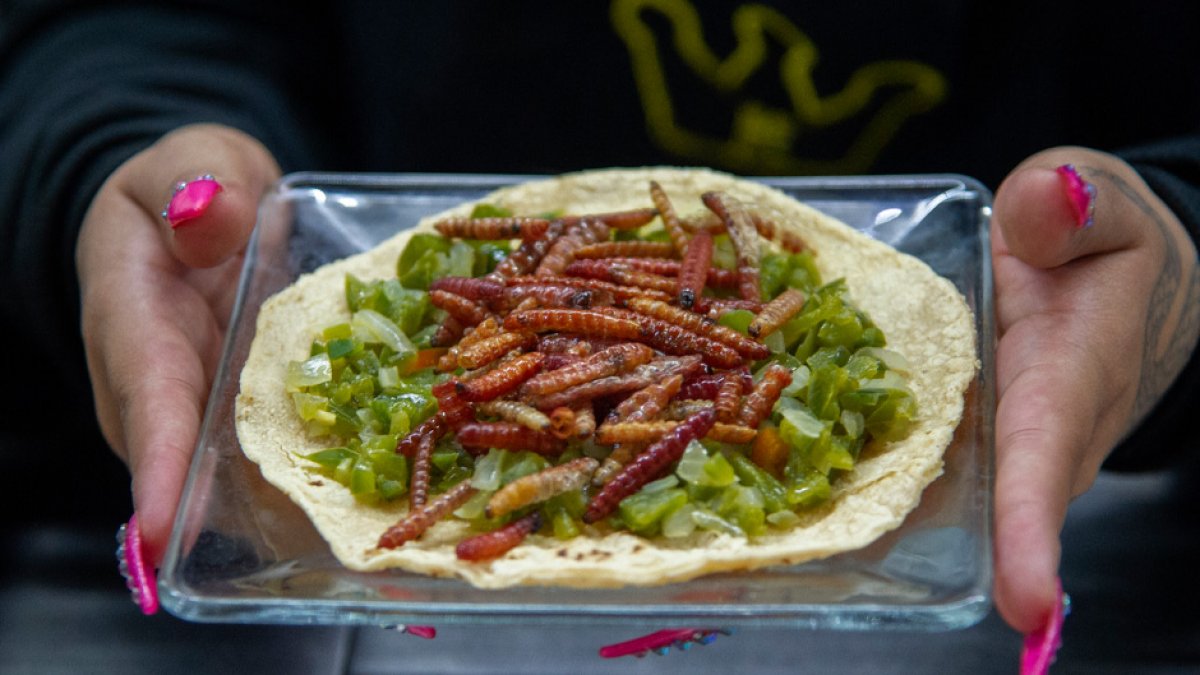Freedom and its enemies: Food dystopia is coming
If the people targeting our food achieve even minimal success, humanity will be condemned to hunger.

(Claudio Cruz / AFP)
Of all the issues that corporate social engineers want to intervene and regulate, food is possibly the most scandalous. When they mess with food, the disasters only get worse. In Sri Lanka, people are still suffering hunger due to the imposition of 'sustainable and inclusive' agricultural policies recommended by international forums and organizations that, among other things, destroyed the country and brought down its government. Poor Dutch farmers continue to struggle to defend their properties from the clutches of climate totalitarianism, which has thrown large sectors of the population into misery also following the guidelines of the priests of supranational do-goodism. These are unpromising omens for those who want to promote resets and recovery agendas. A happy world, and that is why these same people are doubling down on their efforts to shift the new global food paradigm. For this reason, very effective sensationalist campaigns have been launched for many decades to terrorize people.
According to politicians and experts in the 1970s, the climate threat was the arrival of a new ice age; caused, naturally, by man. And, more specifically, by the burning of fossil fuels, those that now cause warming! In 1971 The Washington Post collected the opinions of several experts and scientists about a 6-degree drop in the average temperature of the planet, which would cause a glaciation that could put an end to human existence. According to the fashion of the time, millions of people would die of hunger and cold, and others would have to wear gas masks to be able to breathe.
As time went by, new experts and new doomsday scenarios arrived. The most famous was Al Gore, with his 2006 documentary "An Inconvenient Truth." None of Gore's predictions have been fulfilled: the islands and coastal cities that were supposed to have been submerged underwater for years are still intact; the North Pole ice, whose disappearance Gore predicted for 2013, remains in place. None of this happened, which has not prevented numerous sensationalist people and institutions around the world from continuing to have influence and funds to prevent the supposed apocalypse, whose arrival they continue to cry wolf over without an ounce of shame.
And these sensationalists continue to promote measures of all kinds based on their erroneous predictions. One of the pillars of this progressive agenda is the elimination of meat consumption. This is not a secret conspiracy, but rather centralized and coordinated planning, which is available to anyone with the internet. In fact, there are hundreds of documents that show the UN's proposals to achieve "sustainable agriculture," one of the 17 Sustainable Development Goals (SDGs) that make up its 2030 Agenda, for which it is necessary to modify agricultural production, demonize modern agriculture, reduce livestock farming and meat consumption, promote the consumption of "sustainable" substitutes grown in laboratories, and normalize the consumption of insects. From these objectives arises a cascade of communication actions, laws and regulations whose purpose is to change the way we eat and to do so in a dizzying manner.
It is no coincidence that television and social media are suddenly filled with chefs making recipes with crickets, influencers showing their photos eating ants or other insects; that there are sensationalist reports in the news about the dangers of eating meat, a simultaneous worldwide political intervention in food packaging, government-sponsored vegan festivals and countless other actions with the goal of indoctrination. We have already seen this complete blurring of the line between public and corporate for the imposition of a totalitarian, bizarre, dark and ridiculous agenda. Next comes the food dystopia.
The accelerated transformation of the food industry to avoid “climate change,” which will involve the adoption of new technology in the process of manufacturing and creating alternative food products for consumption, has become a priority for many international organizations and institutions, including the World Economic Forum (WEF), the United Nations and the Bretton Woods institutions, which include the World Bank (WB), the International Monetary Fund (IMF) and the World Trade Organization (WTO).
While the role of the WEF in the Great Food Transformation has attracted more attention in recent months, that of the IMF, the WB and the WTO has gone relatively unnoticed. According to the IMF, “reducing livestock emissions” is one of the key actions necessary to achieve the “climate neutrality goal [also known as net zero emissions] by 2050.” With respect to agriculture, the IMF advises “diversifying beef production” through “the application of better agricultural management practices and new technologies.” In fact, the IMF published a paper in 2019 calling for radical changes to the supply side of food production to decrease “emissions from agriculture.” Specifically, that article stated:
Later in 2020, the IMF highlighted the importance of raising prices for “land-intensive foods (e.g., beef).” This would help reduce the consumption of animal products by shifting “consumer preferences” away from products such as meat, milk and eggs.
According to the World Bank, insect farming can “save money for farmers and foreign exchange for governments, by reducing imports and purchases of food, feed and fertilizers. Small-scale operations can be established at low cost, opening opportunities for climate resilient jobs.” With this in mind, the World Bank is likely to support investments in agricultural projects aimed at “combat climate change” focusing on the introduction and promotion of new food products, as well as the reduction of animal products.
Humanity today produces more food than is needed, despite population growth. Therefore, this irrational search for a food transformation does not obey any altruistic goal: it is simply a play for control.
The EU's "Farm to Fork strategy is one of the key initiatives of the European Green Deal to achieve something difficult to explain, called “climate neutrality,” which they plan to achieve by 2050. Yes, the same people who could not foresee the energy crisis two months ago are now planning the world energy strategy for 2050. The strategy in question aims to “evolve the current EU food system towards a sustainable model,” and to do so they will “guarantee enough food, and that it is affordable and nutritious, without exceeding the limits of the planet, ... halve the use of pesticides and fertilizers and increase the amount of land dedicated to organic farming, ... promote more sustainable healthy diets, ... fight food fraud ... and improve animal welfare.” This toast to the sun full of contradictions and infantilism is not harmless, since from here come laws and regulations that break production systems and supply chains, disasters that bring millions of people around the world to their knees.
The omnipresent FEM, fanatical promoter of all types of radical change, of course wants to “define the agenda of the global agricultural industry” and has dedicated itself to promoting “impossible, fair foods beyond meat with products that try to imitate the sensory profile of meat.” The “impossible” here is not a typo, it is one of the undertakings of another of the gladiators of the universal reset, the specialist in vaccines, meteorology, geopolitics, neurology, chemistry, journalism and gastronomy: Bill Gates. Impossible Foods is one of his ventures, dedicated to developing products that imitate meat. In 2018, the company obtained the UN Champions of the Earth award, and it has received widespread promotion and funding from all the from all of the sensationalists that have managed to establish it as the future of human nutrition. Then, research found that they had higher levels of glyphosate and that they emitted more CO2 than real meat, but that is not a problem, because when it comes to social engineering, what counts is the story and not the facts.
Along the same lines, the UN's Food and Agriculture Organization (FAO) also highlights the benefits of a diet based on bugs:
The most influential organization dedicated to “transforming our global food system” is the EAT-Lancet Commission, which is under the EAT Foundation, a semi-private organization with the objective of meeting the 2050 goals, known as “the Davos of food.”" It was supported by the WHO until serious complaints recently emerged about the promotion of “a standard diet” that excluded all animal-based foods and ignored the age, sex, health and eating habits of communities, without scientific justification. However, the EAT Foundation continues to build up financial and political support. It has developed the "planetary health diet," which the WEF defends as the "sustainable dietary solution of the future" and whose goal is to “reduce the meat and dairy intake of the world's population by up to 90% in some cases and replace it with laboratory-made foods, grains and oil.”
At a 2019 meeting, the WEF called for coordinated efforts between the public and private sectors and an intergovernmental commitment to develop and own a “global narrative on the protein transition in order to overcome the critical cultural and emotional barriers that can stand in the way of the path of a holistic transformation.” Apparently, the geniuses at Davos have realized that it's not easy to convince people to eat bugs raised in garbage. Who would have thought?
If those who have put our food on the most wanted list achieve even a minimal percentage of success, humanity will be condemned, like centuries ago, to hunger. It is important to remember that starvation is a well-known and practiced war strategy. The question of food, the increase in food production, is the empirical confirmation that all the catastrophic forecasts in relation to demographics were wrong. Humanity today produces more food than is needed, despite population growth. Therefore, this irrational search for a food transformation does not obey any altruistic goal: it is simply a play for control.
Added to the scarcity it will cause, it will also imply unprecedented political intervention in distinctive cultural and traditional practices of social groups, communities and traditions. The diversity that politicians pay lip service to will be crushed by a “global sustainable diet” that imposes humiliating and unpleasant alternatives. Food is a vital aspect of cultural heritage that includes celebrations, rituals, family and community festivals: it is not possible to be naïve about what the imposition of a global food system designed by a swarm of experts on the payroll of multilaterally corrupt entities entails.
Abundance and well-being have always been enemies of totalitarianism. No one should be under the illusion that there are noble purposes behind the measures proposed by the IMF, the World Bank and the WTO. In essence, they want to eliminate spontaneous order in favor of an artificially ordered society in which isolated, landless and propertyless masses are expected to endure a life of servitude under the rule of global governance.
It is ridiculous and indecent that, just at the moment when our development as a species reaches the milestone of being able to produce all the food necessary for the billions of us, a handful of obsessive people want to convince us to give that up to eat worms and cockroaches. Food dystopia is one more ridiculous attempt to control as many aspects of our lives as possible, from our health data to our savings and purchases, our mobility and our privacy, until it finally reaches the food on our plates.
























